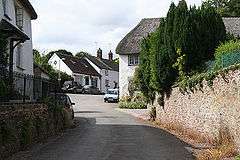Sampford Courtenay
| Sampford Courtenay | |
|---|---|
 Sampford Courtenay | |
 Sampford Courtenay | |
| Sampford Courtenay shown within Devon | |
| Population | 509 (2001) |
| OS grid reference | SS6301 |
| Civil parish |
|
| District | |
| Shire county | |
| Region | |
| Country | England |
| Sovereign state | United Kingdom |
| Post town | OKEHAMPTON |
| Postcode district | EX20 |
| Dialling code | 01837 |
| EU Parliament | South West England |
| UK Parliament | |
Sampford Courtenay is a village and civil parish in West Devon in England, most famous for being the place where the Western Rebellion, otherwise known as the Prayerbook rebellion, first started, and where the rebels made their final stand. It has a population of 509.[1]
The Church of St Andrew is mainly built of granite and has an elegant tower.[2]
It was served by the nearby Sampford Courtenay railway station at Belstone Corner. This station still operates as a halt on the Dartmoor Railway summer weekend service between Okehampton and Exeter.
Literature
Sampford Courtenay is the area author M.R. James had in mind for his short ghost story Martin's Close published in More Ghost Stories in 1911. The New Inn featured in this story is also a real place and a grade II listed old coaching inn originally built in the 16th Century
References
- ↑ Office for National Statistics : Census 2001 : Parish Headcounts : West Devon Retrieved 28 January 2010
- ↑ Betjeman, J. (ed.) (1968) Collins Pocket Guide to English Parish Churches: the South. London: Collins; p. 165
External links
![]() Media related to Sampford Courtenay at Wikimedia Commons
Media related to Sampford Courtenay at Wikimedia Commons